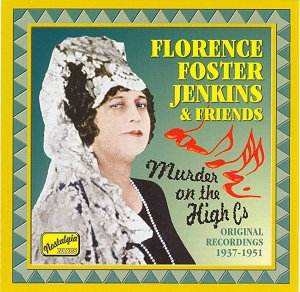The name, Florence Foster Jenkins brings
a wide grin to many an opera buff's face. She is well known to
those who follow singers, not for her superlative renderings of
selected arias, but because of the amusement imparted by arias
so badly sung! With unbearable vocality, this person's ego as
a 1940s singer became so inflated that she gave public concerts.
A reputation spread that the concerts were a source of good entertainment
that they became well attended for the wrong reasons. Assuming
she had genuine admirers, Foster Jenkins made private recordings,
initially for her own delectation. With tongue in cheek the company,
Melotone issued them and they sold well. It is these 78s of 1937-51
that have been dubbed and redubbed to appear first on LPs and
CD under the RCA label.
This new transfer by Naxos is lengthened to include
amusing ditties by other singers, some of which however do not
invoke an equally high level of humour.
Florence Foster Jenkins loved to sing
yet was deaf to her own inadequacies. Married to a wealthy New
Yorker who was preoccupied with business she probably cultivated
an interest in opera and singing to relieve her boredom. Perhaps
initially, she sang with others at cocktail parties where favourable
comments were expressed to her as a matter of politeness (or sympathy).
Such a comment could easily be misread and so she developed her
interest. Her rich husband was happy to finance concerts to amuse
her whilst he was preoccupied elsewhere.
Having a voice with a thin reedy tone and no
vibrato (that can be best described as a wailing cat), it is extraordinary
that she should go as far as hiring New York's prestigious Carnegie
Hall for a concert and, I am told, fill it! There must have been
newspaper reports of this and earlier concerts to give more of
her background, yet none of the notes I have found refer to any.
The same is true for the Naxos notes except for the fact they
have given us something about the Melotone studios that released
the original 78s.
I find the listener's
amusement is heightened by the fact
that she performs with an accomplished
accompanist, Cosme McMoon (see footnote).
The contrast between the serious and
accurate accompaniment and her juvenile
singing is considerable and one wonders
what pianist would allow himself to
be seen on stage knowing that the performance
would be so dreadful. How could he keep
a straight face? Since it is likely
that members of the audience would be
likely to openly snigger, how was it
that she wasn't put off? It must be
that she never looked at the audience
some of whom must have been in near-hysterics.
What is particularly funny is when Foster
Jenkins attempts low notes. She has
no voice for low notes. Listen to tk.8:
as she descends with her 'chop-sticks'
Russian to the bass register the voice
compresses to a whispering growl while
the piano merrily continues with its
Bach prelude. There is no doubt that
she was advised to sing this number
by a promoter, well knowing that a good
laugh could be delivered at her expense.
As with Hoffnung, this a must to play over coffee
to lighten a dinner party, though three tracks is as much as most
will probably stand. When analysing Foster Jenkins performance
one can hear that she is not tone deaf and has a high soprano
register, but manages to hit the wrong notes, a sort of vocal
Les Dawson (this metaphor will only work for our UK readers).
In summing up I would suggest that she is lazy and doesn't practise
her pieces. This is confirmed by the fact that on hearing a Melotone
test record when the engineer points out wrong notes she tells
the producer that there is nothing wrong with it: in other words
she can't be bothered making a second take.
As for the filler tracks, these are a mixed bag
and are not to me particularly funny, certainly not as the singers
go, or am I missing something? Perhaps I was looking for similarly
awful singers to Jenkins, but here the humour lies in the music
and what they sing. Little Jack Horner and Sing a Song
of Sixpence contain exaggerated and comic musical colour which
is matched to the needs of young children. Rossini's Cats duet
or Danny Kaye's send-up of G&S with his drunken portrayal
of Sir Joseph Porter in 'When I was a Lad' (Pinafore)
would have been better fillers had they been available.
Raymond J Walker
footnote
note by Paul Moor seen
on rmcr November 04
Several decades ago,
in New York, she invited me to tea;
I wrote about that (and a recital I
attended at the Delmonico, in an audience
the included Cole Porter & party)
in "Harper's Magazine".
Her pianist, billed as Cosmé
McMoon, actually appeared at the Met
and elsewhere as Kirsten Flagstad's
conductor of choice under his real name:
Edwin McArthur....

